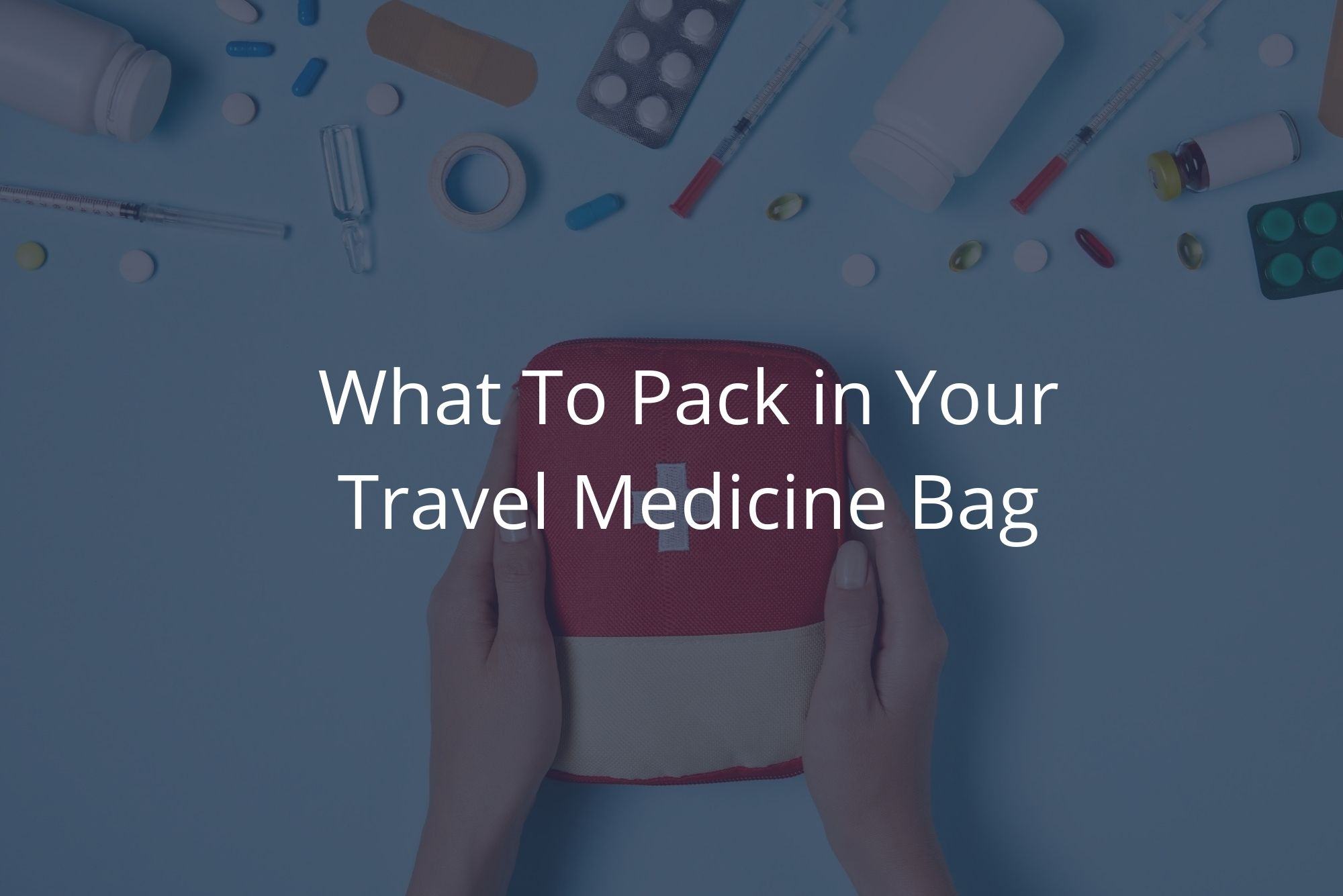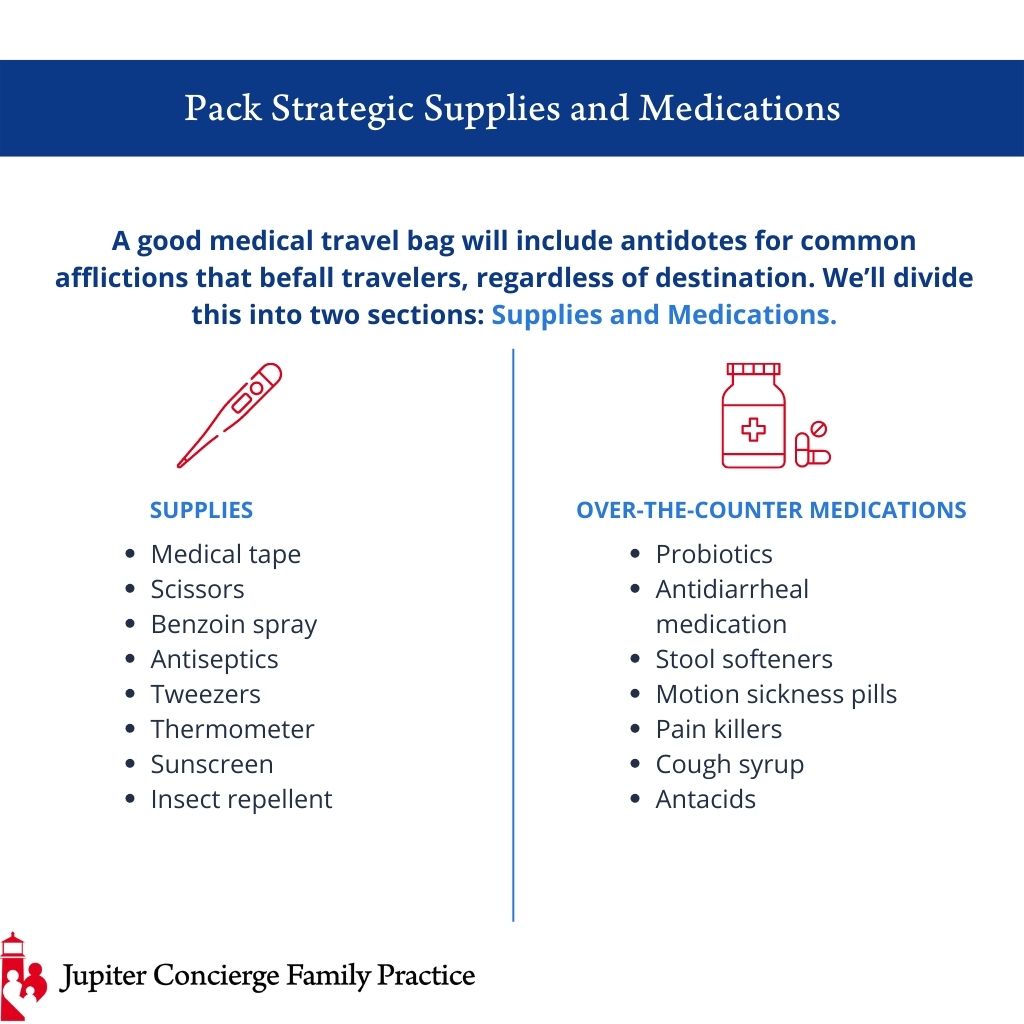
While summertime is the recognized season of vacation, getaways for relaxation aren’t the sole purview of one particular season. Stress elimination is a year-round job, and I encourage my patients to take it seriously. Relaxing and taking time off in whatever way is rewarding to you — international travel, a staycation, or camping in the wilds — is important for your health.
That is, unless you get motion sickness on a puddle jumper, contract an endemic disease on another continent, or develop an infection in that cut you got hiking in the woods.
Fortunately, you can prepare for your relaxing, revitalizing time away with just a few precautionary measures — such as putting together a well-considered travel first-aid kit.
The Travel First-Aid Kit
A travel first-aid kit is especially helpful in situations where you’ll be remote from civilization or unfamiliar with local medical care. It can help you address minor medical needs on your own, or more serious ones until you can get medical assistance.
With this little travel medicine bag, you can arm yourself against the likely — and the unlucky — and get back to putting up your feet.
Here are five no-fail steps to putting together a great travel first-aid kit:
1. Get Vaccinated
Okay, that’s technically not a travel first-aid kit item. But think of yourself as the kit, and the vaccine as the medicine you’ll be carrying with you.
Check with your physician to make sure you’re up-to-date on recommended vaccines. For example, you’ll be glad you got your tetanus booster before your trip if you get cut during an adventurous outing.
If you’re traveling internationally, it’s important to find out whether any vaccines are recommended before arriving at your destination. For example, certain regions are rife with endemic diseases like hepatitis A, meningitis, or typhoid, all of which have vaccines available. The CDC offers a helpful database of recommended vaccines by country, and you can discuss these recommendations with your physician.
Some of these endemic diseases are quite serious, so another important benefit of vaccines before vacation is staying out of the hospital.
Besides the obvious health reasons, a hospital stay can also be loaded down with complicating factors: medical bills, expensive stays for companions, unknown doctors and medical care, and the risk of secondary infections, just to name a few.
2. Know Your Destination
On a related note, it’s important to educate yourself about the endemic diseases of international destinations. Not all of these diseases have vaccines available, although you may prevent many with forethought and planning.
Malaria, for example, is a serious but avoidable disease transmitted by mosquitos in certain areas of the world. If you’re traveling to one of these countries, you’ll need to start a antimalarial medication like Malarone before you go, and learn about recommended malaria prevention protocols and tips.
Check the CDC’s travel notices page, which keeps U.S. citizens informed about disease outbreaks across the world. It has a handy database, too, so you can search your destination to see if any advisories pop up.
A few other tips to stave off sickness on international travels include avoiding well water, locally made ice, and foods prepared with well water (or untreated water). Wash your hands often, and choose thoroughly cooked, hot foods.
3. Know Your History
If you’re prone to certain conditions or diseases, take that into consideration before your trip and prepare accordingly.
Being on vacation doesn’t protect you from illnesses, although it sometimes feels like it does. If you’re susceptible to urinary tract infections (UTIs), bring along your over-the-counter relief so it can keep you comfortable if you need it and until you can get to a doctor.
Pack probiotics in case you’ll need an antibiotic for the UTI, or for a respiratory or skin infection. If you’re often plagued by athlete’s foot, pack your anti-fungal cream. If you tend toward yeast infections, grab a tube of your preferred over-the-counter treatment.
And if you take a regular prescription, make sure you have enough to last the duration of trip — and a little longer, in case of delays.
In short, being realistic about your specific health conditions can save you time, distress, and pain.
Some physicians may prefer to send a round of antibiotics along with you, to be taken as needed. If you have a history of recurrent infections, talk with your doctor before you travel about whether it makes sense to take this kind of proactive approach.
4. Pack Strategic Supplies and Medications
Now that you’ve considered your vaccine profile, the diseases or problems you’re likely to encounter at your destination, and your own medical patterns, you’re ready to pack a solid travel first-aid kit.
Consider what pitfalls you’re likely to encounter on your adventure. If your agenda presents you with certain risks, come prepared.
If you’re going to be hiking, for example, bring an elastic bandage wrap just in case. Small, simple first-aid tools can be life-savers and/or game-changers in these situations.
A good medical travel bag will also include antidotes for common afflictions that befall travelers, regardless of the destination. We’ll divide this into two sections: supplies and medications.
Supplies:
- Medical tape, scissors, Steri-Strips, and benzoin spray — to hold the Steri-Strips in place until you can seek medical care.
- Antiseptics — Betadine or alcohol.
- Tweezers — for pulling out ticks or splinters.
- Thermometer.
- Sunscreen.
- Insect repellent.
Over-the-Counter Medications (OTCs)
These OTCs can keep you comfortable while you either (a) seek medical care or (b) allow the issue to self-resolve.
- Probiotics — in case you’re put on an antibiotic for any reason.
- Antidiarrheal medication — diarrhea from well water, contaminated water, and unfamiliar food on trips is so common it’s called “traveler’s diarrhea.” (Note: Stopping diarrhea can actually prolong the illness, so seek medical care if the diarrhea is severe or associated with abdominal pain or a fever.)
- Stool softeners — Just as often, travel results in constipation instead of (or in addition to) diarrhea.
- Motion sickness pills.
- Antibiotic creams — Bacitracin or Polysporin for minor injuries.
- Pain killers — aspirin, ibuprofen, naproxen, or acetaminophen.
- Cough syrup — though a respiratory illness should also always be investigated by a physician.
- Antacids.
5. Check in With Your Physician
Before you depart on your trip, talk with your physician about your health, your destination, and your travel first-aid kit. Ask if they have any additional recommendations specific to your situation.
An excellent travel first-aid kit is like a life preserver in a stormy sea. It can get you out of rough waters and back on deck — hopefully into a hammock, with the beverage of your choice.

Dr. David Rosenberg
Dr. Rosenberg is a board-certified Family Physician. He received his medical degree from the University of Miami in 1988 and completed his residency in Family Medicine at The Washington Hospital in Washington, Pennsylvania in 1991. After practicing Emergency Medicine at Palm Beach Gardens Medical Center for two years, he started private practice in Jupiter, in 1993. He is an avid baseball fan and Beatles fanatic, since he was 8 years old. He has been married to his wife, Mary, since 1985 and has three grown children.
David completed additional studies at Mercer University, Macon, Georgia and obtained a BS in Chemistry in 1983.
“My interests include tennis, snow skiing, Pilates and self-development.”

